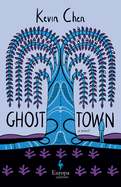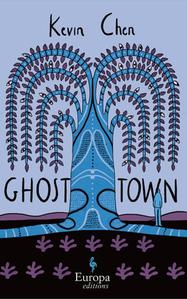
 Former actor turned award-winning writer Kevin Chen's Ghost Town is certainly cinematic, populated with unforgettable characters--living, dead and in between.
Former actor turned award-winning writer Kevin Chen's Ghost Town is certainly cinematic, populated with unforgettable characters--living, dead and in between.
Welcome to Yongjing, "a rural backwater in central Taiwan," just as Ghost Month looms. The Chen clan is about to experience an unexpected reunion, drawn together by the prodigal appearance of the clan's youngest, Keith. Years earlier, a six-month writing residency in Berlin enabled Keith's escape from their abusive mother and homophobic community. He found love with T, which led to a registered partnership ("Germany did not have gay marriage yet in those days"). Then suddenly T was dead, and Keith was imprisoned for murder. When Keith is released 10 years later, he returns to Yongjing, and what's left of his family.
Cliff and Cicada married on their third meeting and had five daughters--Beverly, Betty, Belinda, Barbie and Plenty--trying to birth a son, then came Heath and finally Keith. Beverly left as a teen for factory work in a bigger town but returned home pregnant and married her lover, who proved himself a gambling, philandering, orchid whisperer. Betty, known as Household Registrar Chen, chose a "conservative" husband and had two children; her every day was "boring and predictable" until a manipulated video went viral, maligning her as a hater of seeing-eye dogs. Belinda is "the 'perfect' news anchor's wife"--beaten and trapped when not being paraded in public. Barbie is a total shut-in ensconced in an excessive mansion her business mogul husband built originally for her sister Plenty, who succeeded in killing herself after six previous attempts. First-born son Heath became the town's mayor, winning in a landslide, until he ended up in jail. Into that maelstrom, with nowhere else to go, Keith arrives, with so many family secrets left to be bared and shared.
If the family's name is not a hint of autobiographical inspiration, Chen's (Three Ways to Get Rid of Allergies) afterword affirms plenty of additional overlaps: his Yongjing youth, his many sisters, his gay identity, his town's homophobia, his current Berlin home. Professor Darryl Sterk translates, his unconventional choices--replacing Chinese names with English equivalents-of-a-sort--adroitly explained in his ending note. Chen divulges key events in his fiction--T's mysterious murder, the black dog's execution, Plenty's and neighbor Nut Wang's suicides--in multi-voiced, circular repetition, each time adding a little more information, as if to increase the circumference and take up more space. With each iterative reveal, Chen gloriously resurrects the dead--and emboldens the living. --Terry Hong, Smithsonian BookDragon
Shelf Talker: A cinematic, sprawling family epic unfurls with exceptionally crafted characters--living, dead and in between.

